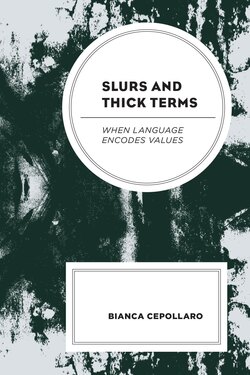Slurs and Thick Terms

Реклама. ООО «ЛитРес», ИНН: 7719571260.
Оглавление
Bianca Cepollaro. Slurs and Thick Terms
Slurs and Thick Terms
Contents
Guide
Acknowledgments
Introduction
NOTE
THE PRESUPPOSITIONAL ACCOUNT OF HYBRID EVALUATIVES
Hybrid Evaluatives
1.1 WHAT COUNTS AS A HYBRID EVALUATIVE
1.1.1 What Slurs Are About
1.1.2 Distinguishing Thick Terms from Thin Terms
1.1.3 Previous Suggestions for a Uniform Account
1.2 THE PROJECTIVE BEHAVIOR OF SLURS AND THICK TERMS
1.2.1 Projection
1.2.2 Rejection
1.2.3 An Alternative Explanation of Projection
1.3 CONCLUSION
NOTES
The Semantics of Hybrid Evaluatives
2.1 THE EVALUATIVE CONTENT
2.1.1 Gradability
2.1.2 Multidimensionality
2.1.3 How to Interpret the Evaluative Content
2.1.4 Inter-variation and Intra-variation
2.2 THE DESCRIPTIVE CONTENT
2.3 WHEN THINGS GO WRONG: PRESUPPOSITIONAL FAILURE
2.3.1 Reference and Extension
2.3.2 What Exactly Is Presupposed
2.3.3 Failure
2.3.4 A Theory of Value
2.4 CONCLUSION
NOTES
The Dynamics of Hybrid Evaluatives
3.1 SLURS IN CONVERSATION
3.1.1 Scenario I—Endorsement
3.1.2 Scenario II—Complicity and Propaganda
3.1.3 Scenario III—Rejection or How to Respond to Slurs and Hate Speech
3.1.4 Slurs and Policies: Theoretical Proposals and Empirical Data
3.2 THICK TERMS: NEGOTIATION AND CONCEPTUAL ETHICS
3.3 CONCLUSION
NOTES
Defending a Uniform Presuppositional Account of Slurs and Thick Terms
4.1. DEFENDING THE UNIFORMITY CLAIM: THE RESIDUAL DIFFERENCES BETWEEN SLURS AND THICK TERMS. 4.1.1 Descriptive and Evaluative Content
4.1.2 The Projective Behavior
4.2 DEFENDING THE PRESUPPOSITIONALITY CLAIM
4.2.1 Slurs and Presuppositions
4.2.2 Thick Terms and Presuppositions
4.3 CONCLUSION
NOTES
Non-standard Uses of Hybrid Evaluatives
5.1 ATTRIBUTIVE AND ECHOIC USES OF HYBRID EVALUATIVES
5.1.1 The Relevance-Theoretic Tools: Attributive and Echoic Uses of Language
5.1.2 The Case of Evaluatives
5.2 WHAT’S SPECIAL ABOUT THE RECLAMATION OF SLURS
5.2.1 Initiation and Conventionalization
5.2.2 In-groupness
5.2.3 The Effects of Reclamation
5.3 CONCLUSION
NOTES
RIVAL THEORIES
Truth-Conditional Theories
6.1 TRUTH-CONDITIONAL THEORIES OF SLURS
6.1.1 The Case of Apparent Lack of Projection
6.1.2 An Attempt to Explain Away Projection: Derogation and Offense
6.2 A TRUTH-CONDITIONAL THEORY OF THICK TERMS
6.2.1 The Core of the Proposal
6.2.2 Negative Strengthening
6.2.3 Clausal Implicatures
6.3 CONCLUSION
NOTES
Deflationary Theories
7.1 DEFLATIONARY ACCOUNTS OF SLURS
7.1.1 Anderson and Lepore: Violating Prohibitions and Taboos
7.1.2 Bolinger: Co-occurrence Expectations and Contrastive Preferences
7.1.3 Nunberg: Markedness, Affiliation, and Manner Implicatures
7.1.4 A Note on Markedness
7.1.5 Slurs and Speech Acts
7.2 A DEFLATIONARY ACCOUNT OF THICK TERMS
7.3 CONCLUSION
NOTES
An Alternative Hybrid Theory
8.1 POTTS’ PROPOSAL
8.2 CHALLENGES
8.2.1 Interaction with the At-Issue Content
8.2.2 Complicity, Failure, and Backgroundness
8.3 CONCLUSION
NOTES
Conclusion
References
About the Author